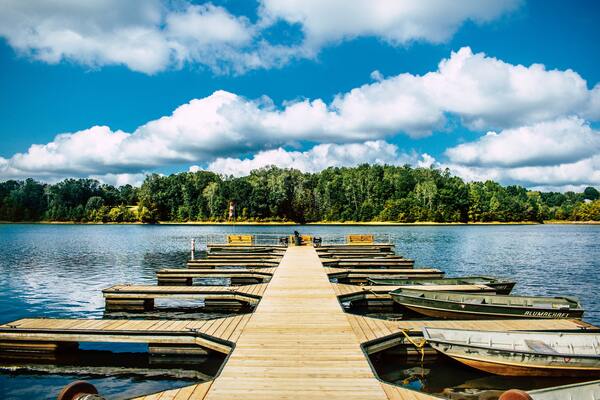Creating Couchbase cluster using Docker compose

In this tutorial, we will walk through Couchbase, a cloud edge server NoSQL database. Then we shall discuss how to set up the 3-node cluster to scale our applications using docker-compose.
Table of contents
- Prerequisites
- Objectives
- What's couchbase?
- Creating nodes for couchbase
- Configuring couchbase cluster
- Rebalancing couchbase clusters
- Conclusion
Prerequisites
Make sure you already have both Docker Engine and Docker Compose installed
Objectives
This tutorial introduces you to the concepts of couchbase and creating node clusters. It helps you scale your applications elastically.
What's couchbase?
Couchbase is a server. It's a NoSQL cloud document-oriented database. This database is a merge of the CouchDB and Membase databases.
It resides in server clusters that have multiple machines with several daemon processes. These processes provide data access from client libraries as well as management functions.
For more details about couchbase, click here.
Creating nodes for couchbase
In this section, we're building the couchbase server nodes that will host a single instance of the couchbase server. This process entails the following steps:
- Installed - where the server is installed but not running.
- Started - In this step, the node server has been started. At this point, you can perform various operations on the console.
- Initialized - After installation, we have an option to initialize our servers.
- Provisioned - You have access to the server as an admin.
Let's proceed to define our docker compose file contents:
# creating couchbase docker compose files
# define couchbase 1
couchbase1:
# get the image from the couchbase/server
image: couchbase/server
volumes:
- ~/couchbase/node1:/opt/couchbase/var
# define couchbase 2
couchbase2:
# get couchbase image for couchbase 2
image: couchbase/server
volumes:
- ~/couchbase/node2:/opt/couchbase/var
# define couchbase 3 and retrieve its image
couchbase3:
image: couchbase/server
volumes:
- ~/couchbase/node3:/opt/couchbase/var
# define our application ports
ports:
- 8091:8091
- 8092:8092
- 8093:8093
- 11210:11210
As we initially discussed, we're building a 3-node couchbase cluster hence the three services definition of the couch bases 1 to 3 above.
Now run the following on the terminal:
# cd to project directory root and run the following command
docker-compose up -d
Output:
Pulling couchbase1 (couchbase/server:)...
latest: Pulling from couchbase/server
25fa05cd42bd: Pulling fs layer
de18b9aa36b2: Pulling fs layer
25fa05cd42bd: Downloading [===========> ] 6.368MB/26.7MB
de18b9aa36b2: Download complete
ec756bf45a97: Waiting
b216da4530f7: Waiting
ec756bf45a97: Downloading [> ] 4.294MB/467.3MB
46635a5df01b: Waiting
25fa05cd42bd: Downloading [====> ]
de18b9aa36b2: Downloading [==================> ] 2.123MB/5.647MBnload complete
19ca04716876: Download complete
1.966kB/1.966kB
e5fe9996db61: Waiting
1a4a55520189: Waiting
Upon completion, check the status of your clusters by running the following command:
docker ps
```
Output:
```bash
CONTAINER ID IMAGE COMMAND CREATED STATUS PORTS NAMES
75690285abdf couchbase/server "/entrypoint.sh couc…" 24 minutes ago Up 24 minutes 8091-8096/tcp, 11207/tcp, 11210-11211/tcp, 18091-18096/tcp couchbase_couchbase2_1
47f963ff40f7 couchbase/server "/entrypoint.sh couc…" 24 minutes ago Up 24 minutes 8094-8096/tcp, 0.0.0.0:8091-8093->8091-8093/tcp, :::8091-8093->8091-8093/tcp, 11207/tcp, 11211/tcp, 0.0.0.0:11210->11210/tcp, :::11210->11210/tcp, 18091-18096/tcp couchbase_couchbase3_1
6b38e3626f96 couchbase/server "/entrypoint.sh couc…" 24 minutes ago Up 24 minutes 8091-8096/tcp, 11207/tcp, 11210-11211/tcp, 18091-18096/tcp couchbase_couchbase1_1
You may as well run the following command to check the status.
docker-compose ps
Output:
Name Command State Ports
-----------------------------------------------------------------------------------------------------------------------------------------------------------------------------------------------------------
couchbase_couchbase1_1 /entrypoint.sh couchbase-s ... Up 11207/tcp, 11210/tcp, 11211/tcp, 18091/tcp, 18092/tcp, 18093/tcp, 18094/tcp, 18095/tcp, 18096/tcp, 8091/tcp, 8092/tcp, 8093/tcp,
8094/tcp, 8095/tcp, 8096/tcp
couchbase_couchbase2_1 /entrypoint.sh couchbase-s ... Up 11207/tcp, 11210/tcp, 11211/tcp, 18091/tcp, 18092/tcp, 18093/tcp, 18094/tcp, 18095/tcp, 18096/tcp, 8091/tcp, 8092/tcp, 8093/tcp,
8094/tcp, 8095/tcp, 8096/tcp
couchbase_couchbase3_1 /entrypoint.sh couchbase-s ... Up 11207/tcp, 0.0.0.0:11210->11210/tcp,:::11210->11210/tcp, 11211/tcp, 18091/tcp, 18092/tcp, 18093/tcp, 18094/tcp, 18095/tcp, 18096/tcp,
0.0.0.0:8091->8091/tcp,:::8091->8091/tcp, 0.0.0.0:8092->8092/tcp,:::8092->8092/tcp, 0.0.0.0:8093->8093/tcp,:::8093->8093/tcp, 8094/tcp,
8095/tcp, 8096/tcp
Now run the following commands to check your nodes' logs:
docker-compose logs
Output:
# our nodes logs
Attaching to couchbase_couchbase2_1, couchbase_couchbase3_1, couchbase_couchbase1_1
couchbase1_1 | Starting Couchbase Server -- Web UI available at http://<ip>:8091
couchbase1_1 | and logs available in /opt/couchbase/var/lib/couchbase/logs
couchbase3_1 | Starting Couchbase Server -- Web UI available at http://<ip>:8091
couchbase3_1 | and logs available in /opt/couchbase/var/lib/couchbase/logs
couchbase2_1 | Starting Couchbase Server -- Web UI available at http://<ip>:8091
couchbase2_1 | and logs available in /opt/couchbase/var/lib/couchbase/logs
Configuring couchbase cluster
In the previous section, we exposed ports to use while setting up the clusters.
Open http://localhost:8091 in your browser.
Output:

Default cluster view:

Setup your couchbase account and add the clusters we added above as shown below:

Rebalancing couchbase clusters
To distribute data evenly, we need to balance our clusters.
To achieve this, browse to the servers tab or click on the pending balance tab to go to the unbalanced clusters.

Conclusion
In this tutorial, we've discussed the couchbase clusters.
First, we used docker-compose to create services for our application. We then created 3-node couchbase clusters and accessed them via the web portal on our local server.
Happy Coding!
Peer review contribution by: Odhiambo Paul













